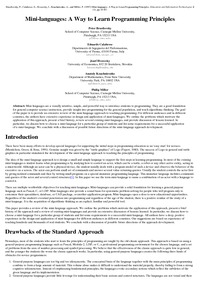 Diese Seite wurde seit mehr als 7 Monaten inhaltlich nicht mehr aktualisiert.
Unter Umständen ist sie nicht mehr aktuell.
Diese Seite wurde seit mehr als 7 Monaten inhaltlich nicht mehr aktualisiert.
Unter Umständen ist sie nicht mehr aktuell.
 Zusammenfassungen
Zusammenfassungen
Mini-languages are a visually intuitive, simple, and powerful way to introduce students to programming. They are a good foundation for general computer science instruction, provide insight into programming for the general population, and teach algorithmic thinking. The goal of the paper is to provide an extensive review of the mini-language approach to teaching programming. For different audiences and in different countries, the authors have extensive experience in design and application of mini-languages. We outline the problems which motivate the application of this approach, present a brief history, review several existing mini-languages, and provide discussion of lessons learned. In particular, we discuss how to choose a mini-language for a particular group of students and list some requirements for a successful application of a mini-language. We conclude with a discussion of possible future directions of the mini-language approach development.
Von Peter Brusilovsky, Eduardo Calabrese, Jozef Hvorecky, Anatoly Kouchnirenko, Philip Miller im Text Mini-languages (1997)  Dieser Text erwähnt ...
Dieser Text erwähnt ...
 Personen KB IB clear | Kent Beck , Allen Cypher , Benedict du Boulay , Jay Fenton , John Monk , Tim O'Shea , Seymour Papert , Richard E. Pattis , David Canfield Smith , Jim Spohrer | ||||||||||||||||||||||||||||||||||||
 Begriffe KB IB clear | Informatikcomputer science
, Informatik-Unterricht (Fachinformatik)Computer Science Education
, Karel
,  LOGO (Programmiersprache) LOGO (Programmiersprache) LOGO (programming language)
, LOGO (programming language)
,  Programmieren Programmieren programming
, Programmiersprachenprogramming languages
, programming
, Programmiersprachenprogramming languages
,  turtle graphics turtle graphics
| ||||||||||||||||||||||||||||||||||||
 Bücher |
| ||||||||||||||||||||||||||||||||||||
 Texte |
|
 Dieser Text erwähnt vermutlich nicht ...
Dieser Text erwähnt vermutlich nicht ... 
 Nicht erwähnte Begriffe | blockbasierte Programmierumgebungen, Informatik-Didaktik, Informatikunterricht in der Schule |
 Tagcloud
Tagcloud
 Zitationsgraph
Zitationsgraph
 Zitationsgraph (Beta-Test mit vis.js)
Zitationsgraph (Beta-Test mit vis.js)
 Zeitleiste
Zeitleiste
 12 Erwähnungen
12 Erwähnungen 
- Programming in schools - why, and how? (Raimond Reichert, Jürg Nievergelt, Werner Hartmann) (2001)


- Kara, finite state machines, and the case for programming as part of general education (Werner Hartmann, Jürg Nievergelt, Raimond Reichert) (2001)


- Theory of Computation as a Vehicle for Teaching Fundamental Concepts of Computer Science - Thesis 15035, ETH Zürich, D-INFK, May 2003 (Raimond Reichert) (2003)



- Programmieren mit Kara - Ein spielerischer Zugang zur Informatik (Raimond Reichert, Jürg Nievergelt, Werner Hartmann) (2003)


- Lowering the barriers to programming - A taxonomy of programming environments and languages for novice programmers (Caitlin Kelleher, Randy Pausch) (2005)


- Unterrichtskonzepte für informatische Bildung - 11. Fachtagung Informatik und Schule der Gesellschaft für Informatik (GI) in Dresden (28.-30. September 2005) (Steffen Friedrich) (2005)

- INFOS 2007 - Didaktik der Informatik in Theorie und Praxis - 12. GI-Fachtagung Informatik und Schule (Sigrid E. Schubert) (2007)

- Lehrarrangements in der Informatiklehrerausbildung (Peter K. Antonitsch, Ulrike Lassering, Andreas Söllei)


- Lehrarrangements in der Informatiklehrerausbildung (Peter K. Antonitsch, Ulrike Lassering, Andreas Söllei)
- WiPSCE 2014 - Proceedings of the 9th Workshop in Primary and Secondary Computing Education, Berlin, Germany, November 5-7, 2014 (Carsten Schulte, Michael E. Caspersen, Judith Gal-Ezer) (2014)
- Scratch vs. Karel - impact on learning outcomes and motivation (Alexander Ruf, Andreas Mühling, Peter Hubwieser) (2014)


- Scratch vs. Karel - impact on learning outcomes and motivation (Alexander Ruf, Andreas Mühling, Peter Hubwieser) (2014)
- Lernumgebungen für den Einstieg ins Programmieren - Versuch einer Klassifikation (Michael Hielscher, Beat Döbeli Honegger) (2015)


- ICER 2015 - Proceedings of the eleventh annual International Conference on International Computing Education Research, ICER 2015, Omaha, NE, USA, August 09 - 13, (Brian Dorn, Judy Sheard, Quintin I. Cutts) (2015)
- ICER 2020 - International Computing Education Research Conference, Virtual Event, New Zealand, August 10-12, 2020 (Anthony V. Robins, Adon Moskal, Amy J. Ko, Renée McCauley) (2020)
- Hedy - A Gradual Language for Programming Education (Felienne Hermans) (2020)


- Hedy - A Gradual Language for Programming Education (Felienne Hermans) (2020)
 Volltext dieses Dokuments
Volltext dieses Dokuments
 |  Mini-languages: Artikel als Volltext ( Mini-languages: Artikel als Volltext ( : :  , 101 kByte; , 101 kByte;  : :  Link unterbrochen? Letzte Überprüfung: 2020-11-28 Letzte erfolgreiche Überprüfung: 2019-08-28) Link unterbrochen? Letzte Überprüfung: 2020-11-28 Letzte erfolgreiche Überprüfung: 2019-08-28) |
 Anderswo suchen
Anderswo suchen 
 Beat und dieser Text
Beat und dieser Text
Beat hat Dieser Text während seiner Zeit am Institut für Medien und Schule (IMS) ins Biblionetz aufgenommen. Beat besitzt kein physisches, aber ein digitales Exemplar. Eine digitale Version ist auf dem Internet verfügbar (s.o.).














 Biblionetz-History
Biblionetz-History